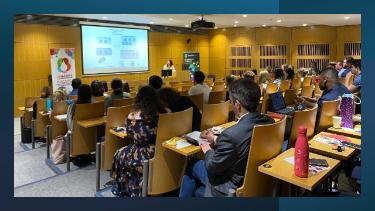UCD's CMAP One of Six Awarded Infrastructure Funding
Director of Systems Biology Ireland Walter Kolch has been awarded €2.68m as part of the Science Foundation Ireland Research Infrastructure Programme.
Kolch's project is one of just six to be funded in this programme and is the only one from UCD. The project entails a national platform for comprehensive molecular analysis (CMAP) underpinning chemistry, the bioeconomy, and precision oncology research: from molecules to microorganisms and humans. CMAP will not only enhance Ireland’s competitiveness to participate in and lead international research, it will also support research in five national priority areas, contributing to a more sustainable environment, better healthcare, and the creation of high-quality jobs.
Minister for Business, Enterprise and Innovation, Heather Humphreys, announced the €25m Government investment on Monday, which goes through the SFI Research Infrastructure Programme as part of Future Jobs Ireland. The funding will be distributed among six research infrastructure projects and will enhance high quality research activities and innovation in areas of strategic priority across a variety of disciplines.
Announcing the awards, Humphreys said: “I am delighted to announce this significant investment under Future Jobs Ireland. The quality of research being undertaken in Ireland today is testament to our world-class research community. This talent combined with the support provided through programmes like this one maintains our reputation as a great place to do business and work. The successful projects are at the cutting edge of innovation and are helping us to achieve our goal of preparing now for tomorrow’s world.”
The five other research projects that will be supported are:
- Dr Timothy McCarthy, Maynooth University - National Autonomous Technologies Data Platform (NATDaP) will provide valuable open Autonomous Technology data (including driverless vehicles, A.I., robotics and drones) from collaborating Higher Education Institutes across Ireland, which can be accessed by a much wider community, including researchers and industry collaborators.
- Prof Kingston Mills, Trinity College Dublin - Next generation flow cytometry and single cell gene analysis – this cutting-edge infrastructure, the only of its kind in a biomedical research Institute or a hospital site in Ireland, will significantly enhance Trinity College Dublin’s cytometry suite capability, enabling rapid analysis for clinical samples.
- Prof Mani Ramaswami, Trinity College Dublin Ultra Low Noise Digital 3T MRI which will enable new programmes of research at three SFI Research Centres and permit participation in international consortia including Horizon 2020. This new MRI scanner will allow Ireland to lead in neurodevelopmental research on infants and children, and in the areas of ADHD, depression, psychosis and Alzheimer’s disease.
- Dr Graeme Maxwell, Tyndall National Institute - Tyndall 200mm FlexiFab - core (national) infrastructure upgrade which will enhance equipment to enable processing on 200mm (8 inch) wafers, a unique asset needed to drive future innovation in ICT research and industry in Ireland.
- Mr. Michael Gillooly, Marine Institute - EirOOS Irish Ocean Observing System: A component of the European Ocean Observing System (EOOS) will further scientific and technical research capacity in key areas such as sea level science, ocean circulation and carbon sequestration allowing us to understand the connection between Ireland and the Atlantic. This infrastructure will also increase opportunities to participate in European funded initiatives under Horizon 2020 and more.
The SFI Research Infrastructure Programme provides research groups with cutting edge infrastructure for the performance of high quality, impactful and innovative research. The programme ensures Irish researchers have the capacity to apply for international funding opportunities including the Horizon 2020 funding calls. Additionally, the programme facilitates inter-institutional sharing of national research infrastructure, especially for Institutes of Technology, as well as effective research partnership with industry through collaborative initiatives.

